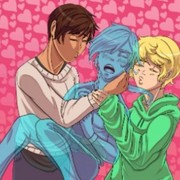Now
John found the night-fair set up in a hollow under the lee of a rocky hill. He did not plunge into it at once, but spent a little time crouching in the rocks, watching the Lordly Folk going to and fro on their business, lingering to watch jugglers or pipers, nibbling on marchpane or gilded gingerbread fairings, or haggling for ribbons, strange weapons, and weird alchemical potions.
The people, and the cluster of tents, stalls, wagons and caravans resembled the mortal fair that came yearly to neighbouring Eyam. But at closer range the resemblance faded. The place was too full of strange beauties and strange grotesqueries for any resemblance to a mortal fair. Each rattled his nerves, as if each was an expression of the same peril. John stopped to speak to no one, but as he walked he tried to search each passing face, to scan the items sold at each stall. Here were strange and preposterous marvels: mice the size of goats being sold saddled and bridled by little brown men, a lady in a gabled hood carrying a tiny lion like a lap-dog, a man dancing to the piping of a big brown bear, as well as a mass of more familiar things—blades, wool, glass, lozenges, kerchiefs and fortune-tellers.
He hardly knew where to start.
What did he have to go on, after all? The dream of a fabulous beast and a magical flower?
It was between a spicery and a glass-blower selling clear bubbles in which strange flowers bloomed or colourful fishes swam that John heard a burst of harp-notes. A voice began to sing.
Down in yon forest there standeth a hall:
The bells of Paradise, I heard them ring:
It’s covered all over with purple and pall
And I love my beloved above anything.
In that hall there standeth a bed:
The bells of Paradise, I heard them ring:
It's covered all over with scarlet so red:
And I love my beloved above anything.
Somehow the song seemed clean and honest compared to everything else around him. John had no particular reason to hope, but he elbowed through the press of people that stood listening to the voice. When he fought to the fore of the crowd, he saw that the harper was a young man, fair-haired and grey-eyed in figured velvet and gold lace. But the fair hair was long and lank, the velvet threadbare, the gold tarnished.
At the bed’s side there lieth a stone:
The bells of Paradise, I heard them ring:
Rosa Mundi written thereon:
And I love my beloved above anything.
Under that bed there runneth a flood:
The bells of Paradise, I heard them ring:
The one half runs water, the other runs blood:
And I love my beloved above anything.
The minstrel’s fingers ran over his strings in the hush between verses, plucking out little ripples of sound like tear-drops of light falling in the forest after a summer storm. He looked up at John and grinned; and his pale face, which John had thought slack and shiny behind the short pointed beard, became suddenly winsome.
At the bed's foot there groweth a thorn:
The bells of Paradise, I heard them ring:
Which ever blows blossom since he was born:
And I love my beloved above anything.
He plucked the last chord and then damped the strings with the palms of his hands. As the music died, there was a smattering of applause from the onlookers and a rain into the harper’s upturned cap of coins and jewels and odder things—beans, marbles, a large red-and-gold beetle. As the young man set down his harp and picked up his hat to sort through the contents, the crowd melted away, moving on to other stalls and sideshows.
John took his chance, and edged closer. “What does it mean, this song?”
The harper glanced up at him with a glint of flattered surprise and another charming smile. “Mean?” His voice had an accent to it—very like Scots, John would say, if the man was mortal. “Oh, something profound and weighty, I’ll warrant. Is it not a sweet air?”
“But what does it mean precisely?”
“I’d not venture to say precisely.”
John swallowed and tried again. “The song speaks of a Rose. That signifies something, surely?”
The harper stared into his battered black cap and fished out the golden beetle. He turned it back and forth, watching its legs wave, and John thought his question had gone unheard until the fellow murmured his answer under his breath.
“Yes.”
Eagerly, John shifted his weight on his feet. “You know of it. I am in search of a Rose—”
“I have heard tell of it. No more.”
“But can you tell me where to find it?”
To his surprise, the harper smiled bitterly. “You see me, friend. Do I look as if I know where to find the wonderful Rose?”
John did not understand, but he blinked in the chill of the harper’s voice. “I beg your patience. I did not know I spoke amiss.”
The harper sighed, clapped his cap onto his head, and rose from his stool, tucking the harp under his arm. “Of spells and enchantments you seem clean enough. Why seek the Rose?”
“Not for myself. For another.”
The harper pulled a soft leathern cover over his instrument and fastened the latchet, shaking his head. “Once, friend, I travelled the length and breadth of Faerie looking for the Rose. But never did I find more than old-wives’-tales. Likely it is nothing more.”
“But there are tales?”
The harper stopped fumbling with his harp and looked up at him. “You know not the tales? How then do you know of the Rose?”
“I have seen it. If you do not know where to find it, who will?”
“I tell you it is hopeless.”
It could not be hopeless. John set his jaw. “There must be someone.”
The harper twisted his mouth in thought. “If anyone knows, the Queen does. That is certain. But—”
“Queen Mary? In London?”
The harper glanced at him in surprise. “Queen Gloriana. In many-towered Cleopolis, in the dark heart of Faerie.”
“Well: and if I go there, will she receive me?”
“Oh, aye. She would welcome you for my sake.” The harper slung his harp on his back, and bowed with a deep flourish. “Sir Thomas Lene, Knight of the Court of Faerie.”
John snatched off his cap. “John, smith of Middleton Dale. You would show me the way, master?”
“Aye, I would show you the way, but—”
“Is it far?”
“No, indeed. No further than would serve for the drinking of a health to each of the nether princes, but—”
“And you say the Queen is certain to know if the Rose is in Faerie.”
“If! But I tell you, friend, it is the seventh year, and comes close to All Hallows’ Eve. I would put it off if I were you.”
Put it off? John clenched his cap. Go back to Middleton Dale without the Rose? Without Janet? He forced himself to focus. “Too close to All Hallows’? With Lammas hardly gone?”
A pause. “Lammas, you say?”
“Two days gone.” He set his jaw. “If I must go to Cleopolis, I must go to Cleopolis. If you do not take me, someone else will.”
The faerie knight cocked his head and turned down the corners of his mouth in a motion of assent. “There and back again by All Hallows’? Why not? Very well, friend, I will take you to Cleopolis.”











Comments (0)
See all